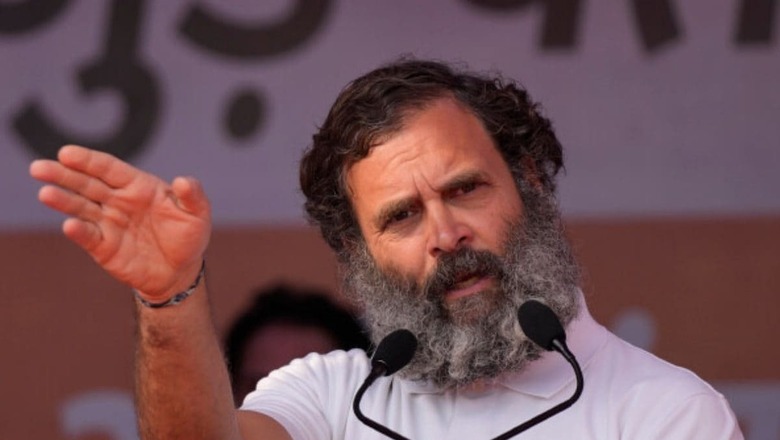
views
Congress leader Rahul Gandhi lost his Lok Sabha seat as he was convicted and sentenced to two years of imprisonment in a criminal defamation case. Gandhi was accused of defaming a particular community by branding them “thieves” and a case was filed against him in Surat, Gujarat, by BJP MLA Purnesh Modi.
It is important to recall that in May 2016, the Supreme Court of India upheld the constitutional validity of sections 499 and 500 of the Indian Penal Code (IPC) that provide for criminal defamation, observing that the law has no ‘chilling effect’ on free speech. In its judgment, the apex court observed: “Right to free speech is not absolute. It does not mean freedom to hurt another’s reputation which is protected under Article 21 of the Constitution.”
Defamation is defined in the IPC in four sections:
Section 499 states: Whoever, by words either spoken or intended to be read, or by signs or by visible representations, makes or publishes any imputation concerning any person intending to harm, or knowing or having reason to believe that such imputation will harm, the reputation of such person, is said, except in the cases hereinafter excepted, to defame that person.
Section 500 states: Whoever defames another shall be punished with simple imprisonment for a term which may extend to two years, or with a fine, or with both.
Section 501 states: Whoever prints or engraves any matter, knowing or having good reason to believe that such matter is defamatory of any person, shall be punished with simple imprisonment for a term which may extend to two years, or with fine, or with both.
Section 502 states: Whoever sells or offers for sale any printed or engraved substance containing defamatory matter, knowing that it contains such matter, shall be punished with simple imprisonment for a term which may extend to two years, or with fine, or with both.
The IPC also provides explanations of the above-mentioned instances of defamation which are enumerated below.
Explanation 1: It may amount to defamation to impute anything to a deceased person, if the imputation would harm the reputation of that person if living, and is intended to be hurtful to the feelings of his family or other near relatives.
Explanation 2: It may amount to defamation to make an imputation concerning a company or an association or a collection of persons as such.
Explanation 3: An imputation in the form of an alternative or expressed ironically, may amount to defamation.
Explanation 4: No imputation is said to harm a person’s reputation, unless that imputation directly or indirectly, in the estimation of others, lowers the moral or intellectual character of that person, or lowers the character of that person in respect of his caste or of his calling, or lowers the credit of that person, or causes it to be believed that the body of that person is in a loathsome state, or in a state generally considered as disgraceful.
Important judgments related to defamation
There are several landmark judgments related to the defamation law, the most important and recent being the Subramanian Swamy versus the Union of India case which was decided in 2016 by the apex court. In 2014, Swamy accused former Tamil Nadu chief minister Jayaram Jayalalithaa of corruption against which the Tamil Nadu government filed a defamation case. Swamy in turn challenged Sections 499 and 500 of the IPC under which he was booked.
While upholding the constitutional validity of sections 499 and 500, the apex court stated: “The international human right treaties explicitly provide for the right to reputation as well as right to free speech and expression. The Universal Declaration on Human Rights, 1948, in Article 12 clearly stipulates that no one shall be subjected to attack on his honour and reputation. Scrutinising on this score, it cannot be said that reputation should be allowed backseat whereas freedom of speech and expression should become absolutely paramount. Though certain countries have kept the remedy under common law and have decriminalised defamation, yet it does not mean that where the law criminalising defamation is maintained, the said law is unreasonable and, therefore, unconstitutional.”
Other important cases that need to be read for a fair understanding of defamation law in India are DP Choudhary & others versus Kumari Manjulata, SMC Pneumatics India Pvt. Ltd versus Jogesh Kwatra, Avnish Bajaj vs. State, and Vyakti Vikas Kendra versus Jitender Bagga.
While Congress leader Rahul Gandhi was convicted and sentenced for defamation, usually defamation cases end with an apology or settlement between the contending parties.
Commenting on the defamation law, eminent jurist Fali Nariman in his book ‘God Save The Hon’ble Supreme Court’ writes: “Defamation actions in India are a luxury at that. They are too often filed in a hurry and repented only at leisure. And then it is too late. I dissuade clients from filing such action — civil or criminal.”
Read all the Latest Explainers here


















Comments
0 comment